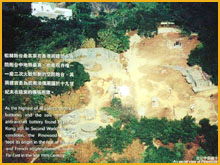
November 12th 2006 was Remembrance Sunday - the day Britain remembers its war dead and pays tribute to those who lost their lives in past conflicts. Having been brought up the U.K., I was taught a lot about WWII at school and of course U.K. popular culture has covered those events extensively in films and television programmes.
As 'bbcs', I think it's fair to say that we know quite a lot about the war from Britain's perspective but almost nothing about the war from an Asian perspective. This is something I wanted to address.
For example, it recently dawned on me that I knew nothing about WWII history in relation Hong Kong. I kind of promised myself to look into it and find out more about that period in history and I was pretty shocked at what I discovered after just a few minutes of searching.
Surprising fact no. 1: Japanese forces launched their attack on Hong Kong less than 8 hours after they bombed Pearl Harbor. It's a little shocking to me that the Pearl Harbor attack is an ingrained part of my general knowledge -
everyone knows about Pearl Harbor, right? - and yet I had no idea about the Hong Kong attack until a few days ago.
British, Canadian and Indian forces did their best to repel the Japanese attack, but their air force was decimated, most of the defences were geared towards a naval attack and they were outnumbered two to one on the ground.
The Battle of Hong Kong lasted 18 grueling days before the British governor surrendered at a meeting in the Peninsular Hotel on December 25th, 1941. Yep, Christmas Day. Yep,
that Peninsular Hotel. Where
Felix is.
An account of the military action can be found here.Surprising fact no. 2: Hong Kong was under Japanese rule for 3 and a half years. Again to my shame I hadn't really been aware of this part of Hong Kong's history. Japanese General Rensuke Isogai became the first Japanese governor of Hong Kong after the British surrender and remained so until the Japanese themselves surrendered on August 15th 1945, after the Hiroshima and Nagasaki bombs.
During the occupation, Hong Kong continued to be a bilingual island but the languages were Chinese and Japanese, not English. Shop signs and street names were changed accordingly. Lane Crawford had its named changed to Matsuzakaya. The Peninsula Hotel became the Matsumoto.
Over 2000 people living in Hong Kong who were of Allied nationality were placed in an internment camp in Stanley.
The Hong Kong Dollar was outlawed and being caught with HKD would result in torture. Locals were forced to exchange their HKD for Japanese war currency. But this currency became further and further devalued as the war progressed and was ultimately declared worthless. This meant Hong Kong citizens who no longer had their original HKD were made completely destitute.
Surprising fact no 3: Hong Kong's citizens endured war crimes and tyranny during the Japanese occupation. I had always associated Japanese war crimes with mainland China (the much debated Nanjing Massacre, for example) and had no clue that similar incidents took place in Hong Kong.
It is reported that the day of the British surrender, Japanese troops tortured and killed injured soldiers and medical staff at St. Stephen's College, a field hospital (
http://ststephen.org.hk/History.htm)
Entire villages were destroyed by the Japanese; Cheung Sheung is one where only a trace remains. Thousands were repatriated to China. Death by starvation caused by a mis-managed economy were common, and dissent and rebellion were punished by torture and death.
Reliable figures are hard to come by but there are reports that up to 10,000 rapes may have been committed by Japanese troops in the early stages of the invasion and the total population of Hong Kong is known to have dropped from 1.6 million to around 600,000 by the end of the occupation.
Surprising fact no. 4: Hong Kong had it's own WWII resistance fighters. Some did fight back. The Gangjiu Da Dui Guerillas gained a foothold on Lantau Island and were able to intercept Japanese intelligence as well playing a central role in the rescuing dozens of Allied nationals, including 20 Brits.
The Dongjiang Guerillas came from Guangdong and were mostly peasants, students, and seamen. After the British retreat, the guerilla force numbered 6000 and established bases in the New Territories and Kowloon. They protected traders in Kowloon and Guangzhou, killed those they believed to be collaborators, and attacked Japanese bases at Tai Po and Kai Tak Airport. They also rescued Allied prisoners-of-war (Sir Douglas Clague, Professor Gordan King, David Bosanquet) as well as twenty American pilots who parachuted into Kowloon when their planes were shot down by the Japanese.
Little seems to have been recorded about the Hong Kong WWII resistance movement and details are sketchy.
Here are a few links for further reading:
Hong Kong Veterans Commemorative AssociationA recent protest in Hong Kong called for Japan to acknowledge and apologise for its actions in Hong Kong during WWII.Japanese tourists came to Hong Kong to learn more about the events surrounding the occupation.Wikipedia summary: 'The Battle of Hong Kong'The Chinese Alliance for Commemoration of the Sino-Japanese War VictimsAnswers.com: 'The Japanese Occupation of Hong Kong'A military view of the ill-fated battleWell that's my attempt to provide a very condensed 'primer' about Hong Kong during WWII. I hope it's been useful. I have to admit that I was little ashamed at how little I knew about this episode in history and I'm glad I started researching it. After all, this all happened just 65 years ago.










